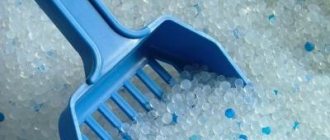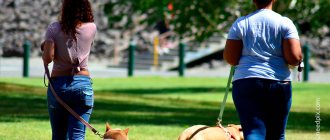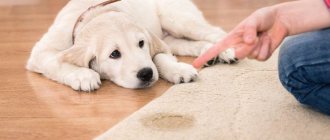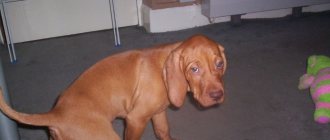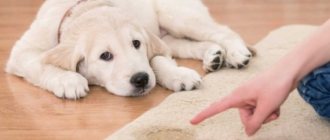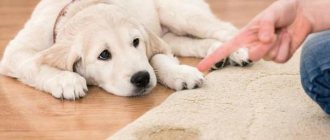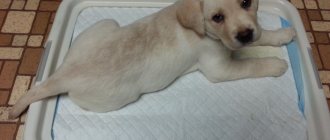Why the dog began to pee on the bed: reasons for the behavior
The causes of unwanted behavior are divided into physiological and pathological. The former do not pose a health hazard and can be easily corrected. The latter can lead to serious violations. They are treated with medication or surgery.
Instincts
Problems with urination can be explained by both innate and acquired instincts. This group includes non-dangerous reasons such as:
- Young age. Puppies do not yet know how to control their bladder. They relieve themselves wherever they find them.
- Marking the territory. The tendency to leave marks develops after puberty. Please note that not only males, but also some females do this.
- A reflex inherited from the mother. Regular stimulation of the tummy before going to the toilet is fixed at the level of instincts. If the puppy is accustomed to peeing every time his mother licks him, then do not be surprised that regular belly scratching can lead to a similar result.
- Adverse weather conditions. Relieving yourself in severe frost is very unpleasant. The most resourceful pets begin to do this at home, that is, in more comfortable conditions.
- Lack of education. If an adult animal is not toilet trained, then the same methods are applied to it as when training a puppy.
- Violation of the regime. A pet may pee due to too long breaks between walks.
- Revenge. Another possible reason for leaving a puddle is a strong resentment. The dog may take revenge for abuse or lack of attention.
- Habit. Bed linen and upholstery on the sofa can be mistaken for a diaper. In this case, the animal simply tries to follow the established rules and does not understand its misconduct.
All of the above should not affect your well-being. Loss of activity, apathy and other alarming symptoms are characteristic of illnesses and nervous disorders.
Disease
If there is a pathology, the animal urinates in the wrong place not of its own free will, but because of pain or incontinence. In the first case, it tries to find a corner where it will feel better, and in the second, it simply does not have time to run to the tray or wait until it goes outside.
The listed disorders are typical for the following diseases:
- urolithiasis and cystitis;
- gastrointestinal diseases;
- renal pathologies;
- internal organ injuries;
- weakness of the bladder sphincter in old age.
The exact cause of incontinence can only be determined through diagnostics. To do this, you will have to seek help from a veterinary clinic.
Nervous disorders
In addition to the usual lack of attention, there are more serious reasons, including:
- stress caused by moving, going to the vet, or adding a new family member;
- fears and phobias;
- unstable psyche.
The latter case is very rarely correctable, since the cause of fearfulness is congenital, not acquired. In all other cases, it is enough to eliminate the provoking factor and take a course of sedatives.
Causes
Living beings don't do anything for nothing. A dog urinates on the bed in the following cases:
- She got sick. Problems with the liver, kidneys and gastrointestinal tract prompt the animal to look for new places for the toilet: it wants to relieve itself, where it is softer, or to get rid of obsessive pain. If a dog urinates without waiting for the usual walk time, whines, looks lethargic, hides in secluded places and loses appetite, this means illness.
- She doesn't know when her next outing is and doesn't see the need to hold back. If the owner takes her for walks little by little, at different times, and sometimes forgets to walk at all, the dog begins to urinate wherever he has to, including in the bed.
- She's offended. Contrary to popular belief, dogs also have feelings. If the dog was yelled at for no reason, if his paw was stepped on or punished, he can take revenge by making a puddle of the offender in his bed.
- She's nervous. Dogs are frightened and made nervous by various things - moving, a loud quarrel between owners, fireworks under the window, a loud washing machine, aggression from other dogs. And under stress, controlling urination is difficult for a dog, especially if it belongs to one of the mini breeds.
- She's going through a transition period. As puppies grow into young teenage dogs, they begin to test their boundaries, just like human teenagers. It is significant to make a bed - even in front of the owner - this is one way to check.
- She has no idea where to relieve herself. If a dog has lived for a long time on the street, in a shelter or on a chain, it does not know that people do not go to the toilet in the house, and it will do as it is used to: it will pee wherever it wants.
The last option is for the dog to mark its territory. This is natural behavior for pack predators, but it is unacceptable for a pet living in an apartment.
Why does a dog mark an apartment?
For a bitch, the mark is a sign that she is in heat and that she will happily meet any male who smells her. Instinct tells the dog to mark everything around and wait for a worthy candidate for mating to be found.
For males, everything is a little more complicated. Most often they mark to show other males their presence in a particular territory. By leaving a mark, the male declares: “mine.” However, this behavior does not appear in everyone, and even if it appears, it disappears over time when the dog realizes that no one is encroaching on the property.
It also happens, however, that a male dog begins to mark in order to attract the attention of a female dog. She doesn’t even have to be nearby - the dog just needs to smell the smell on a walk or from a window.
In females, the desire to mark goes away with the heat. For males, everything is individual.
What to do if your dog pees on the bed
Having figured out why your dog pees in the bed, feel free to move on to weaning it. One of the three methods below is suitable for this.
Behavior correction
If the problem lies in too rough treatment, reconsider your own behavior and try to use softer methods of influence. Pay more attention to your pet and do not forget about the basics of training:
- Make room for the tray. If your dog is used to going to the toilet at home, but has just recently moved, take the litter tray with you. A familiar smell will guide the four-legged animal to the right place.
- Use ban commands. Stop unwanted behavior with a strict “Ugh” or “No.”
- Limit access to beds and sofas. The dog must understand that these items are available only to the owners. You can jump on them only after receiving the appropriate command.
When correcting behavior, remember to use a combination of punishment and rewards. All family members should be involved in training the pet, since even a single indulgence can nullify all efforts.
Solving problems with physiology and health
Active marking can be waited out, but in this case the animal will still mark its territory in the future. The only reliable way is castration or sterilization.
If the problem lies in pathology, then be sure to show your pet to the veterinarian. In this case, you won’t have to rack your brains about how to stop your dog from shitting on the sofa. After recovery, she will again relieve herself in the proper place.
In addition to taking medications and surgery, the help of an animal psychologist may be required. This doctor helps to cope with severe stress and phobias.
Changes in life schedule
We will have to make changes to our life schedule. To do this you will need:
- Increase the amount of liquid you drink. The more your pet drinks before going for a walk, the more likely he is to urinate outside.
- Make walks more frequent and longer. Go out for a walk every time your dog asks, and don’t come home unless he’s done all his chores. If there is no free time, it is recommended to entrust walking to a dog sitter.
- Add more activity. Outdoor games and jogging stimulate the bladder, making you want to go to the toilet. If your pet doesn’t like to play alone, find him a four-legged partner right on the street. A new friend can help not only with company, but also with his example. Imitation works especially well with puppies.
- Isolate access to the room for several days or carefully ensure that the dog is not left alone in it. If he continues to rush to the scene of his crime, then the likelihood of resentment is high. In this case, the four-legged dog simply needs to be given more attention, supplementing daily walks with joint games and interesting trips to nature.
If health problems and poor upbringing are excluded, then the listed recommendations will quickly give the desired result.
Categorical refusal
How to stop a dog from peeing on the bed if it categorically does not want to relieve itself outdoors? In this case, experienced breeders advise purposefully performing the following actions:
- Find a friend with whom the pet will actively frolic, which will cause the urge to go to the toilet. In addition, another dog can become an excellent example, and the pet will gradually begin to imitate.
- It is necessary to water the animal before and during the walk. After active games, you should go to a more secluded place and leave the dog alone. You cannot go home if the dog has not had a bowel movement.
- When going for a walk, you should not walk peacefully around the yard. In order for a dog to have a desire to go to the toilet, it must run around a lot. If after this all the “wet” things are done, then you need to praise the dog, give him a treat and go home.
- Animals cannot endure too long. Therefore, it is worth increasing the walking time until the pet gives up.
Many breeders are faced with the problem and do not know how to stop a dog from peeing on the bed. The tips above almost always help.
Should punishment be applied?
When urinating in the wrong place, you just need to be firm. It is important not to forget about the boundaries of what is permitted and to maintain balance. Punishments for undesirable actions must be accompanied by generous rewards for success.
What methods of punishment can be used
Methods of punishment must be exclusively humane. The most effective include the following:
- Demonstration of superiority. Take your pet by the withers and press his muzzle to the floor for a couple of seconds, saying “Fu” or “No” in a stern voice. When performing this action, do not lift the dog off the ground, do not poke it directly into a puddle, and do not scream.
- Distraction at the time of crime. When you catch an animal performing an unwanted action, sharply clap your hands or throw a light object at it that will definitely not cause pain. The process of urination is very intimate, so such a violation of privacy causes aversion to the chosen place.
- Taking away your favorite toy. Having lost his favorite ball several times in a row, the four-legged dog will think a hundred times before peeing in the wrong place. Unlike food, a toy is not a basic necessity, so such punishment is quite harmless.
Please note that punishments must follow for each recorded offense. Otherwise, the dog will associate them not with his guilt, but with unreasonable cruelty - since he will not understand why he is being punished.
Prohibited Measures
Prohibited measures include anything that can affect the physical and mental health of the animal. Screaming, beating, deprivation of food, games and walks are unacceptable. Abuse will not only not give the desired result, but will also worsen the situation.
When should you not scold your pet?
Swearing is useless unless the animal is caught red-handed. Delayed punishment does not give the desired effect, since the offender simply does not understand why exactly he is being reprimanded.
Also, don't scold the poor guy if he's obviously sick. Just leave the situation unattended, throwing your energy into treating the pathology.
Kidney failure in dogs
Clinical signs usually appear when more than 75% of the functional capacity of both kidneys is impaired. This is a disease that progresses over several months.
Symptoms of serious kidney problems:
- Increased thirst;
- Anorexia (loss of appetite) and weight loss;
- Halitosis (bad breath);
- Weakness;
- Vomit;
- Ulcers (mucous membrane of the mouth and stomach);
- Anemia;
- Pale mucous membranes (gums);
- Neurological signs: ataxia (loss of coordination of movements) and seizures.
Unfortunately, there is no cure, and the impact of clinical signs is minimized by certain medications and foods low in protein, phosphate, and sodium.
Reward sometimes works better
Despite the effectiveness of punishment, positive motivation always works better than negative motivation. For this reason, do not forget to praise your pet after relieving itself outside. In addition to affection and kind words, treats work well.
You can consolidate the desired skill using a certain sequence: command - action - encouragement. As soon as the dog starts to sit down, tell him to “write” or any other code word. Having achieved success, give out a tasty treat as a reward and be sure to express your admiration.
How to Stop Urine All Over Your House
Problems with your dog peeing everywhere can sometimes go unnoticed. Too often, dogs will be scolded for urinating in inappropriate places in the house when in fact they are in pain or unaware that they have urinated, as in “urinary incontinence.”
It should be kept in mind that while most cases of urinary tract disease can be cured with adequate treatment, some conditions may be life-threatening (urinary tract obstruction) while others will require special attention throughout the animal's life.
Article written by Tania Laurin, Certified Veterinary Technician.
How to deal with a puppy
If a decent dog pees on the bed as an adult, then most often the problem lies in pathology. With puppies, everything is different. Due to their age, they are just learning to restrain their urges, so you need to be patient and start training.
To toilet train you will need:
- Isolate access to rooms with sofas and beds, and remove all carpets from the floor.
- Learn the ban commands and the “Place” command.
- Choose a separate corner for diapers or a tray.
- Go for walks before each feeding, immediately after waking up and shortly before bed.
- Follow a routine so that the puppy learns to withstand certain intervals without incident.
You can remove the diapers after the baby begins to relieve himself on every walk. Left without backup options, he will quickly realize that the only right place is outside the house.
Urine stones
These are stones or crystals called uroliths (and the medial condition "urolithiasis").
These stones can settle anywhere in the urinary tract, but are most often found in the bladder or urethra. They are classified according to their chemical composition. The most common stones are phosphate or oxalate based, but there are also stones formed from cystine or urate.
Treatment methods for urinary incontinence
This is the involuntary release of urine. There is loss of urine without the animal being able to urinate. Sometimes the animal urinates in its sleep.
Urinary incontinence can be caused by a congenital anomaly (malformation at birth), trauma (fracture, dislocation of a vertebra), tumor (bladder, prostate), spaying in female dogs, etc.
This type of problem is also very common in puppies who have difficulty controlling the muscles they use to urinate.
It is also a medical cause that is common in older dogs and can have a variety of causes.
